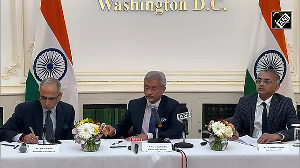'Celebration parties' are now passé. Top performers are nowadays rewarded with what's known as 'international offsite' -- a conference abroad, with ample sight-seeing and entertainment thrown in.
Mixing work with pleasure has caught the fancy of the Indian corporate world, particularly the Indian operations of global firms, as a way of rewarding their employees. It helps companies ensure bonding among employees. Many companies also see such meetings as retention tools.
Few weeks ago, Adecco PeopleOne took as many as 100 permanent employees -- fully 20 per cent of its staff strength -- to Bangkok for a conference, later visiting Pattaya, the popular tourist destination off Thailand.
The company, the world leader in human resource solutions, sees it as worth the effort.
"It is only part of the overall framework of the organisation," says Ajit Isaac, Managing Director, Adecco-India and Middle East.
Those who showed promise of good leadership qualities and performed well above the average, and who the firm cannot afford to lose, were an automatic choice for the off-sites, he said. Apart from helping team building, it is also seen as being part of the company's development process.
HTMT Global Solutions, the BPO arm of the Hinduja Group, is one firm that is planning international off-sites for its Indian employees (it has already had them in India for its employees from elsewhere in the world). HTMT, which has delivery centres in the US, Canada, Philippines, India and Mauritius, had conducted an offsite in India for its employees from India and abroad.
"We have had proposals for holding an international offsite for the Indian employees. We have operations in Philippines and Mauritius, and we could have an international offsite for Indian employees there," says Malini Deekshit, Vice-President, HR at HTMT Global.
It is a break from the routine, and allows senior managers to interact with employees in an informal setting and hence to understand them and their needs better -- something that could have been difficult in the hurly-burly of the office.
"It is a means to keep the good performers motivated and to retain talent too," adds Deekshit.
Rewarding high-performing employees is usually the main objective of such an effort, though. Companies find that it is more cost-effective and time-saving than recruiting new people and training them. Finally, it is an effort to enable employees to understand the objectives of the company in a relaxed environment, said a HR consultant.







 © 2025
© 2025